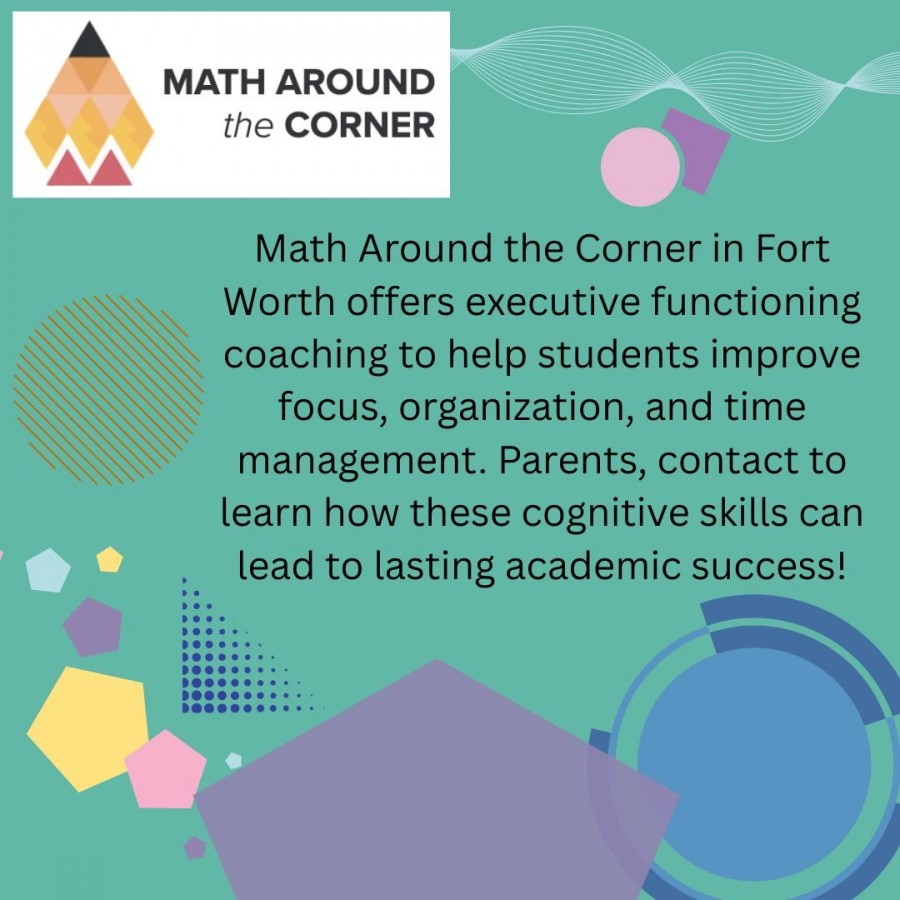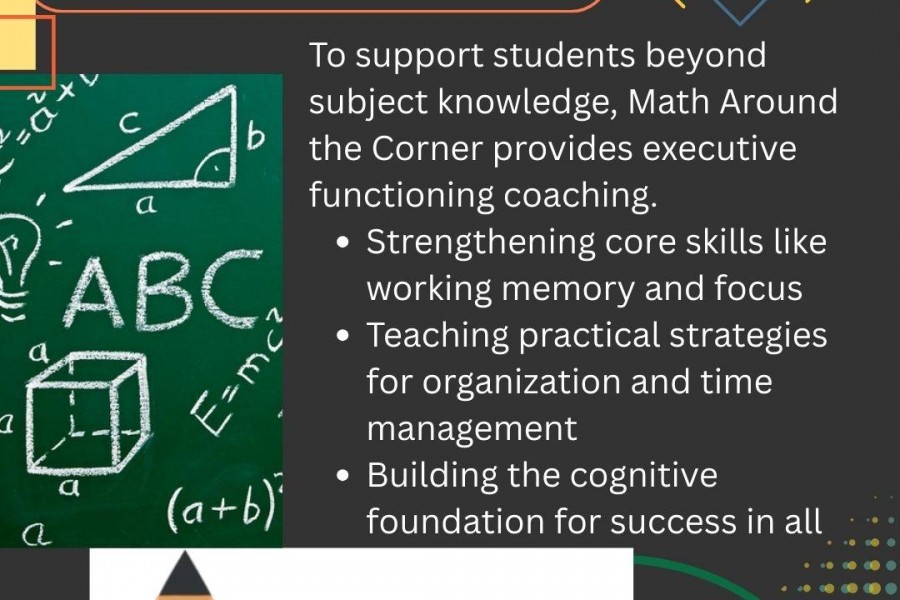How Executive Functioning Skills Can Boost Academic Success

Strong executive functioning skills help students plan, focus, organize, and persist through academic challenges. Students with better executive function abilities demonstrate improved performance in math, reading, and overall school achievement. These cognitive skills can be developed through executive functioning coaching and targeted practice, making them powerful academic success strategies.
Executive functioning coaching addresses three core areas that directly impact learning: working memory (holding information while using it), cognitive flexibility (adapting thinking strategies), and inhibitory control (managing impulses and attention). At Math Around the Corner, we integrate such coaching into our tutoring sessions, giving students the tools to strengthen working memory, build flexible thinking, and improve organization for lasting academic growth. These academic success strategies help students improve focus in school while developing their organization skills across all subjects.
Key Takeaways
1. Executive Function Skills Drive Academic Performance
Working memory, cognitive flexibility, and inhibitory control are stronger predictors of school success than IQ. They can be developed through targeted practice and executive functioning coaching.
2. Students Can Improve Focus in School with Simple Strategies
Academic success strategies like structured routines, timer-based work sessions, and breaking large tasks into smaller steps help students build lasting concentration abilities.
3. Student Organization Skills Create Learning Success
Effective student organization skills, including physical systems, assignment tracking, and time management, reduce stress and help students handle increasing academic demands.
4. Executive Functioning Coaching Targets Root Causes
Professional executive functioning coaching addresses the underlying cognitive skills needed for all subjects, providing personalized strategies that traditional tutoring often misses.
5. Early Support and Parent Involvement Make the Difference
Students with executive function challenges benefit most from consistent routines, environmental supports, and professional guidance that helps develop these critical skills over time.

What Are Executive Functioning Skills?
Executive functioning skills are the mental processes that help students manage their thoughts, emotions, and actions to achieve goals. Think of them as the "CEO of the brain" - they coordinate and control how students approach learning tasks.
The three core executive function skills include:
Working Memory: The ability to hold information in mind while using it. Students use working memory when following multi-step directions, solving math problems, or writing essays while keeping the main topic in focus.
Cognitive Flexibility: The mental agility to switch between different concepts or approaches. This skill helps students adapt their problem-solving strategies when the first approach doesn't work or when transitioning between various types of activities.
Inhibitory Control: The ability to resist impulses and maintain focus despite distractions. Students with strong inhibitory control can stay on task during lessons, think before responding, and ignore irrelevant information.
A complete meta-analysis of over 7,900 students found that executive function skills demonstrate "good predictive power" for academic performance in primary education, with the strongest relationships occurring in younger students.
At Math Around the Corner, we help students strengthen these executive functioning skills so they can approach learning with confidence, independence, and long-term academic success.
How Executive Function Challenges Impact Student Performance
Students with weak executive functioning skills face specific academic obstacles that often get misunderstood as laziness or lack of motivation. Understanding these challenges helps parents and teachers provide appropriate support.
Working memory difficulties cause students to lose track of multi-step instructions, forget what they were doing mid-task, or struggle to hold math formulas in mind while solving problems. A student might understand fraction concepts but forget the steps needed to add fractions with different denominators.
Poor cognitive flexibility leads students to get stuck using ineffective strategies. They might insist on solving all math problems the same way, even when a different approach would be more efficient. These students struggle to see problems from multiple perspectives or adapt when assignments change format.
Inhibitory control weaknesses result in impulsive responses, difficulty filtering distractions, and problems with sustained attention. Students might blurt out answers before thinking, get sidetracked by classroom noise, or rush through assignments without checking their work.
Students with executive function challenges often experience increased anxiety about schoolwork, lower academic self-confidence, and more conflicts with teachers who misinterpret their struggles as behavioral issues.
For students with ADHD, the challenges are particularly pronounced. Research indicates that children with ADHD may lag 30% behind their same-age peers in executive function development. However, studies show that these skills can be developed with targeted support.
Why Executive Function Skills Are Important for Math Success
Mathematics places heavy demands on executive functioning skills, making them especially critical for computational and problem-solving success. Math requires students to hold multiple pieces of information in mind while manipulating them according to specific rules and procedures.
Working memory supports math learning by allowing students to keep track of their place in multi-step problems, remember math facts while applying procedures, and hold the problem goal in mind while working through calculations. Students with poor working memory might solve part of a long division problem correctly, but forget to complete the final steps.
Cognitive flexibility enhances mathematical thinking by helping students recognize when to switch strategies, understand that problems can be solved multiple ways, and transfer learned concepts to new situations. Flexible thinkers can see that 8 × 7 can be solved as (8 × 5) + (8 × 2) when they don't recall the math fact automatically.
Inhibitory control supports mathematical accuracy by helping students resist making automatic but incorrect responses, carefully attend to operational signs, and double-check their work before moving on. Students with strong inhibitory control recognize when a problem requires subtraction instead of addition, and they take time to verify that their answers are logical.
A large-scale study of over 2,000 students ages 5-17 found particularly strong correlations between executive function abilities and both reading and math achievement, with these relationships remaining stable across all grade levels.
Evidence-Based Strategies to Improve Focus in School
Students can improve focus in school through specific academic success strategies that build executive functioning skills. These approaches work best when implemented consistently across different learning environments as part of student organization skills development.
Create structured routines that reduce cognitive load and support attention regulation. Students benefit from predictable schedules, designated spaces for different activities, and consistent procedures for common tasks. These academic success strategies free up mental resources for learning rather than figuring out what comes next.
Break large tasks into smaller steps to make them more manageable and maintain focus over time. This approach helps students improve focus in school by making assignments feel achievable and providing opportunities for success.
Use timer-based work sessions to build attention stamina gradually. Students might start with 10-15 minute focused work periods followed by brief breaks, gradually extending the work time as their concentration improves.
Minimize environmental distractions while teaching students to manage those they cannot control. These student organization skills include reducing visual clutter, using noise-canceling headphones when needed, and learning strategies for refocusing when attention wanders.
Developing Student Organization Skills for Academic Success
Student organization skills form the foundation for academic success by helping students manage materials, time, and assignments effectively. These academic success strategies can be taught explicitly and improved through consistent practice to help students improve focus in school.
Physical organization systems help students manage materials and reduce the time spent searching for items. Effective student organization skills include color-coded folders for different subjects, designated spaces for supplies, and regular cleanout sessions for backpacks and lockers.
Assignment tracking systems represent key academic success strategies that help students monitor due dates and break large projects into manageable parts. Whether using physical planners or digital tools, students need consistent methods for recording assignments and tracking progress.
Time management techniques are fundamental student organization skills that help students estimate how long tasks will take and plan accordingly. Students learn to build in buffer time for unexpected challenges and schedule difficult work during their peak energy periods.
The Role of Executive Function Coaching
As a leading tutoring company with two decades of experience, our team at Math Around the Corner understands the importance of executive function. Professional executive functioning coaching provides personalized support to help students develop stronger cognitive control skills. Unlike traditional tutoring that focuses on subject content, executive functioning coaching targets the underlying skills needed for learning across all academic areas through proven academic success strategies.
Individualized assessment identifies each student's specific executive function strengths and challenges. Executive functioning coaching uses formal assessments and behavioral observations to understand how executive function difficulties manifest in the student's daily academic life.
Explicit strategy instruction teaches students specific techniques for managing their cognitive resources effectively. Through executive functioning coaching, students learn research-based approaches for improving working memory, building cognitive flexibility, and strengthening inhibitory control.
Metacognitive development helps students understand their own learning processes and become more self-directed. This aspect of executive functioning coaching teaches students to recognize when they need specific strategies and evaluate their effectiveness.
How Parents Can Support Executive Function Development
Parents play a vital role in helping their children develop stronger executive functioning skills through daily interactions and environmental support.
Establish predictable routines that reduce decision fatigue and support executive function development. These academic success strategies include consistent morning routines, homework times, and bedtime procedures that help children develop internal organizational systems and improve focus in school.
Model executive function strategies by thinking aloud when planning activities, organizing materials, or solving problems. Children develop student organization skills by observing how adults approach complex tasks and manage multiple responsibilities.
Provide environmental support that makes organization and planning easier. Effective academic success strategies include designated spaces for homework and supplies, family calendars visible to everyone, and systems that help children maintain organization independently.

Taking Action: Getting Started with Executive Function Support
Math Around the Corner understands the critical role that executive functioning skills play in academic success. Our one-on-one tutoring approach allows us to identify each student's unique executive function profile and provide personalized support that addresses both subject-area learning and the underlying cognitive skills that make learning possible.
During executive functioning sessions, our trained tutors assess students' attention span, focus abilities, goal-setting skills, working memory, and organizational capabilities. We then develop individualized strategies to strengthen these areas through direct instruction and practice embedded within academic content.
Students work on personal assessments to build self-awareness, engage in activities that develop organizational and planning skills, practice following multi-step directions, and learn flexible problem-solving strategies. Our approach recognizes that executive function skills develop over time and provides the scaffolded support students need to build independence gradually.
Ready to help your child develop the executive functioning skills needed for academic success? Contact Math Around the Corner today at (817) 720-6284 or email hello@matharoundthecorner.com to learn more about our executive function coaching services. Our boutique approach means your child receives personalized attention in a supportive environment designed to build both academic skills and the cognitive control abilities that support lifelong learning.
Serving Fort Worth and the broader DFW metroplex, Math Around the Corner combines the personal touch of local, hands-on tutoring with the latest research on executive function development. With evening and weekend hours available, we make it convenient for busy families to access the support their children need to thrive academically.
Our experienced tutors work with students from kindergarten through college, providing the same personalized attention whether meeting in-person or virtually. We understand that executive functioning skills form the foundation for success in all academic areas, which is why we integrate this support across our extensive tutoring services.
